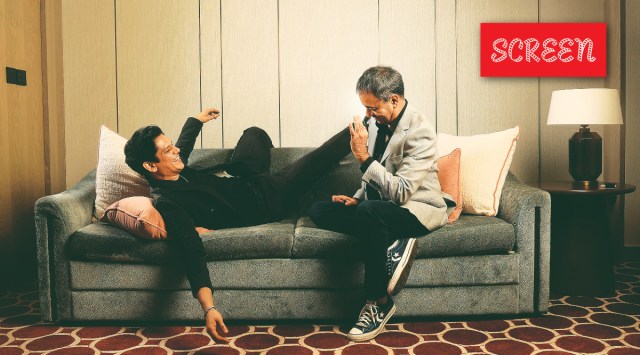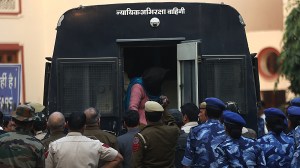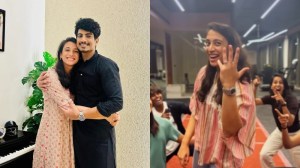Click here to follow Screen Digital on YouTube and stay updated with the latest from the world of cinema.
Rajkumar Hirani’s hit mantra: ‘We remember Mughal-E-Azam because it was a great film, not for the business it did’
Rajkumar Hirani and Vijay Varma spoke to The Indian Express at the Screen relaunch on their craft, the numbers game and why scale doesn’t matter
 Rajkumar Hirani and Vijay Varma at the SCREEN launch event.
Rajkumar Hirani and Vijay Varma at the SCREEN launch event. I believe you are the last of the filmmakers in Hindi cinema to make what we call a pan-Indian film. So tell us a little bit about that process. What makes a Rajkumar Hirani film a Rajkumar Hirani film?
Rajkumar Hirani: We’ve never sat down and tried to dissect and say that this is a formula to make a pan-Indian film. You work with your gut feel. A filmmaker chooses a subject that kind of draws them. Somebody will make horror films, somebody thrillers because that subject draws them, and if it draws you, you have a little more knowledge about it. Like if I’m doing a PK (2014), I obviously have a point of view about religion or if I’m doing 3 Idiots, I have a view on how education should be. That’s the way you start writing. I don’t think you can sit and say that I’m going to write a pan-Indian film. If you say, oh, this person in LA will like this, let me give him a rap there, or in Bihar, let me give him an item song, then you will try and make it like a bhelpuri, which won’t work. So you have to go with your gut.
Now people are talking about films that come from the South, where people are making these massive films with massive stars and massive moments. I feel during the pandemic, our viewing patterns have changed. Our whole world changed and everybody still prefers sitting inside their homes to watch movies, even on their phones. Do you believe that we will ever go back to your kind of films, where there will be the human first, rather than the machine?
Hirani: Ten years, 20 years ago, there was nothing available, no OTT, there was not so much content on the phone, so you would be thirsty to come to a theatre every Friday. Now that visual thirst is gone. Before going to sleep, people are spending two hours watching reels. So the immediacy of landing up in a theatre every Friday possibly is going away. But at the same time, I feel, if you have an engaging enough story — it need not be necessarily about scale — then people will go and watch.
We might be failing in giving that. It’s not about scale. It’s about a connect. In fact, scale, I feel, can get exhausting beyond a point. How bigger can your explosions become?
In 2024, there have been only two films which have actually worked. Everything else, especially what we call tent pole — big star, big budget films — have all pretty much crashed and burnt at the box office.
Hirani: I think people have more choices now. In a way, a globalisation of cinema has taken place. People are watching cinema from the rest of the world also, so they’re being selective. Only when they hear some great things about a film will they go to the theatre. But I think it’s only the the platform that will change. I don’t think cinema viewing will stop. I guess everybody needs stories.
Vijay, most of your work in the last few years has all been on OTT. Do you feel sometimes that you want to watch yourself on the big screen? Does it limit you to have a screen which is smaller than the 70mm?
Varma: I think I had a theatrical release before the pandemic but not since. I have two to three or sometimes four releases a year, and they’ve all been on the streamers. So I’ve been on the other side of it. The whole box office business and what it does to an actor, to a filmmaker, is something that I can only look from the outside. Having said that, I’ve found great audience on the streaming platforms. The quality of work has also been improving. But do I want others to watch me on the big screen? Yes.
This numbers game, how much of it is real, how much of it is completely made up? How much of that conversation impacts you as a filmmaker? And how much of it is, you think, detrimental to the way movies are being made today?
Hirani: Honestly, it’s a very sad way of judging cinema. It’s a collaborative art where we work very hard for many years to create something and if it’s being judged by money, it’s sad. I don’t know how it started. Actually, newspapers put them out, then producers start putting them out. It’s a trap. And now people judge the film by how much business it (is doing)… so it does affect us. Ideally, one would like a situation where people just stop talking about how much business the film is doing and talk about how it is. Because honestly, none of us will remember how much business Mughal-E-Azam (1960) did or what any film in the past did. We judge that film by a memory of that film — ‘wow, that was a great film’. Finally, it’s how much space it made in your heart.
Vijay, many of your roles have been in the grey zone. In one you are a serial killer and I know many people couldn’t sleep after watching you. Is it something that bothers you, that you see a pretty girl and she will think of the character that you played and say, yaar isse toh bhaago (let’s run from him)?
Varma: It used to bother me. It started with Pink (2016). It was a minor part and I remember it was a screening for women and all actresses were invited. I remember seeing some of these people that I’ve always seen on screen, singers, musicians, actresses, for the first time. I was so happy but at the end of the screening, some of them were crying. I tried to console somebody, I think it was Sunidhi Chauhan, and she was like, don’t come near me, I’m very scared of you. I thought what has happened. And then the director took me out and said you have done a great job.
In the last few years, the trolling that happens of filmmakers, of actors, the kind of language that it is used is really deeply offensive. How do you both deal with this kind of negativity that surrounds you?
Varma: What hurts me most is that an innocent person might think what is written by a person is real but some of it is so motivated and paid for. I think this is something that needs to be curbed.
Hirani: There was a time when I used to find the world very disturbing and evil. Then, I went off Twitter and Instagram, and suddenly the world seemed nicer.
 Rajkumar Hirani and Vijay Varma were present at the SCREEN launch event. (Photo: Indian Express)
Rajkumar Hirani and Vijay Varma were present at the SCREEN launch event. (Photo: Indian Express)
Questions from the Audience
Do you feel that we’re very quick in our business to arrive at sweeping generalisations? So, suddenly, when we have three rom coms that work, we all talk about rom coms getting back into fashion. Do you think we should be a little calmer and view every film contextually, or are generalisations the norm of the day?
Hirani: When I made my first film, Munna Bhai M.B.B.S (2003), I came from the Institute (FTII), I was an editor and then I made ad films so I didn’t know the rules of the industry. The film got made, the trials were taking place and one very big filmmaker walked up to me. He saw my film and liked it. With his arms around me, he took me to one corner and said, ‘kya kar diya tumne’ (what have you done)? So I got scared, you know, the film is releasing in two days. I said, what happened? He said, how can you take Sanjay Dutt, who is an action hero, and make him do a film like this? How can you make a whole film in a hospital? How can you shoot all your songs in Bombay? You have to go out of Bombay, you have to go to Switzerland. So there were some four or five things which were very general rules. I panicked. That night I couldn’t sleep. I said, I’ve made a disaster. Of course, people liked the film. So, I think, yes, we do make judgments and our judgments are based on what’s happening to other films. But cinema is such a fluid medium. One film will come and will break all rules.
Vijay, I want to know how your experience was working with the rappers for Gully Boy?
Varma: Gully Boy introduced me to the Bombay hip-hop scene and I fell in love with it. I heard this music for the first time. I had heard Naezy and Divine, then I met all these boys.
What is that one character that you feel very proud of?
Varma: There are many projects that I have received a lot of love for but there are a couple of them which I feel are hidden gems. They haven’t been watched by many, but I personally love them a lot. One is a web series called Kaalkoot. It’s a coming-of-age story of a police officer, which is very interesting. And another is called OK Computer. It’s sci-fi and comedy coming together.
Has the showmanship gone to a toxic level where it’s coming in the way of art and cinema?
Hirani: We can’t really generalise, it’s an individual thing. If you’re secure in your boots, then I don’t think it will really matter how you dress up or in which car you travel in. I’ve seen actors who have just come and haven’t done even one film, but they feel they have to have a certain kind of a car. I keep telling them, nobody is going to give you a role, seeing your car, we’ll see you and give you a role. When I met Aamir (Khan) to narrate the script of 3 Idiots and we travelled together, he came in his rubber slippers and shorts. I was like, yeh hero hai meri film ka? So if you are secure, you really won’t worry about all these things.
Varma: It could be different for different people. I was raised humbly. But, you have to put your best foot forward because this is show business. However, that can’t be your identity. And that cannot be the point of discussion about you. Because what you create on screen as characters is the only thing that people will remember in the longer run. I think Pankaj Tripathi summarised it best for me. He said, main charchit nahi banna chahta hun, mai yaadgaar banna chahta hun ( I don’t want to be popular, I want to be remembered).
- 01
- 02
- 03
- 04
- 05


































